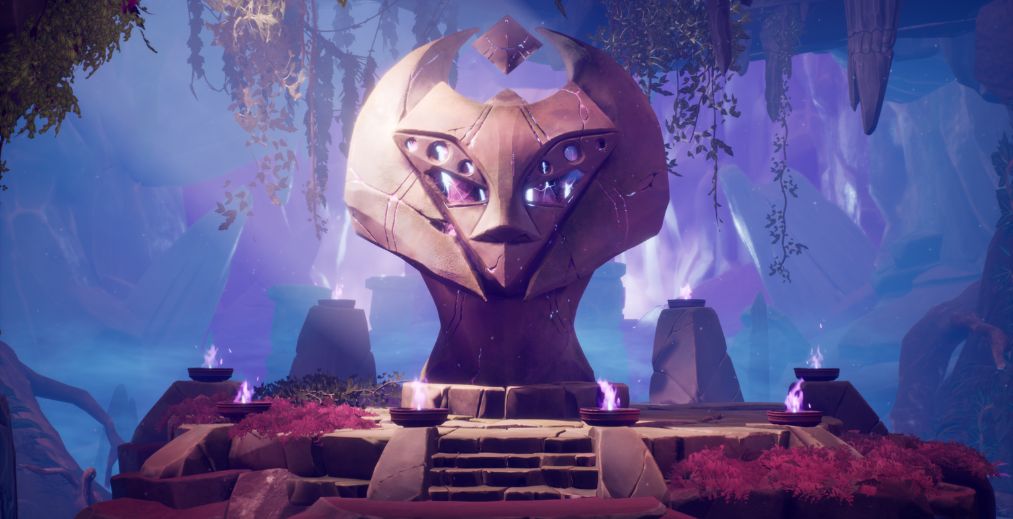Spoiler Warning: Spoilers ahead for Tales of Kenzera: ZAU
Zau’s journey through the land of Kenzera is fraught with hardship and danger. But while the physical threat of giant bugs and environmental hazards command the bulk of the player’s attention, the game also tells a rich narrative. One that is uplifting and self-affirming, even if it centers around death and loss. It uses Zau’s past and present hardships to explore the importance of acceptance and understanding.
The most obvious example of how Zau must learn acceptance comes from the story’s central concept: his father’s death. A parent’s death is always a hard thing to accept. As a presence in their life since childhood, their place can feel like one of the few constants provided by the ever-changing world. It is easy to take their company for granted. Even though Zau was aware that his father’s life was drawing to an end ahead of time, it didn’t make the reality any less difficult for him to grasp. Throughout Tales of Kenzera: ZAU, we see him lash out at the obstacles put in his way. He tries to frame his quest as righting a wrong as if his father’s death isn’t a natural part of life.
It is Kalunga, the God of Death, who most directly helps Zau shift his view. As the young man lashes out in anger, Kalunga patiently helps guide him. He is willing to accept the boy’s feelings, having undoubtedly witnessed such scenes many times in his long existence. His acceptance of Zau’s feelings helps him, in time, come to accept the massive change his world is undergoing.
The passing of Zau’s father forces more change in Zau than just an emotional and supportive whole in his life. As a shaman, his father’s title passes on to Zau. Tales of Kenzera: ZAU forces its protagonist to accept his new role, even as it frequently causes him to remember his father and how he did things. At first, Zau is highly skeptical of his ability to fill his father’s shoes.
Like many who have positive experiences with their parents, Zau sees his father as one who is larger than life. That he could ever fill those shoes is initially preposterous to him. However, time and again, when the people of his world need him, he never fails to help. Even though his focus feels firmly affixed to restoring his father’s life, he doesn’t hesitate to offer his aid to others. Through these numerous moments, he eventually finds his way to the realization that he can perform the duty his father has left him.

The third major element of Zau’s life he learns to accept comes from an unexpected source. Early in the game, Kalunga asks Zau about his mother. Unwilling to answer at first, he eventually opens up when the duo are exploring his mother’s homeland. We learn that his mother left Zau and his father when he was very young. He speaks of how she was a warrior and how often she felt distant, even before she left. It’s clear at first that Zau cannot understand how his mother could leave him. How she could abandon those who love her, and that she seemed to love in return.
It is through Zau’s struggle to accept his own life’s changes that he finally can understand his mother. Just as he is struggling to return his life to its former state, so too did his mother wish to live in the warrior’s way she had before. While this realization doesn’t lessen her absence in his life, it allows him to understand her motives. To see her as something other than just a villain. It’s not that she wanted to hurt him, or didn’t care at all. It’s just that there was something she needed. Something incompatible with what her life had become.
While Tales of Kenzera: ZAU uses several avenues throughout the game to help Zau come to these realizations, there is one element of importance that links them all. Something that helps him approach the numerous conflicts throughout his journey with an eye clear enough to see what is before him. This key component is meditation. Numerous times during his journey, Zau comes across special trees that he meditates under. While his thoughts during these moments are not generally about his current problems, the player can feel Zau’s mental state heal thanks to these contemplative moments.
While virtues like perseverance and strength are often highlighted in video games, contemplation, and reflection are frequently overlooked. Tales of Kenzera: ZAU ‘s use of this important element of life helps tie all of the struggles and changes Zau faces together. They are all part of him now. And for him to overcome the challenges he can and accept the elements of his world he cannot, quiet thoughtfulness is a far more potent weapon than mystical abilities and shaman trinkets.
While Tales of Kenzera: ZAU challenges players with its Metroidvania-style gameplay, it also takes them on an emotional journey of struggle and acceptance. Through Zau, players get to experience the steps to overcoming the challenges of life and the importance of acceptance.
Legends of Kenzera: ZAU is available now on Xbox Series X|S, PlayStation 5, PC (via the EA app for Windows, Steam, and the Epic Games Store).







